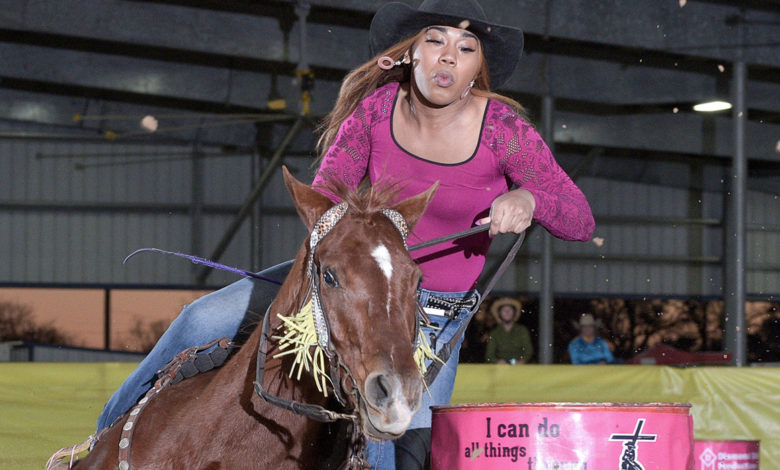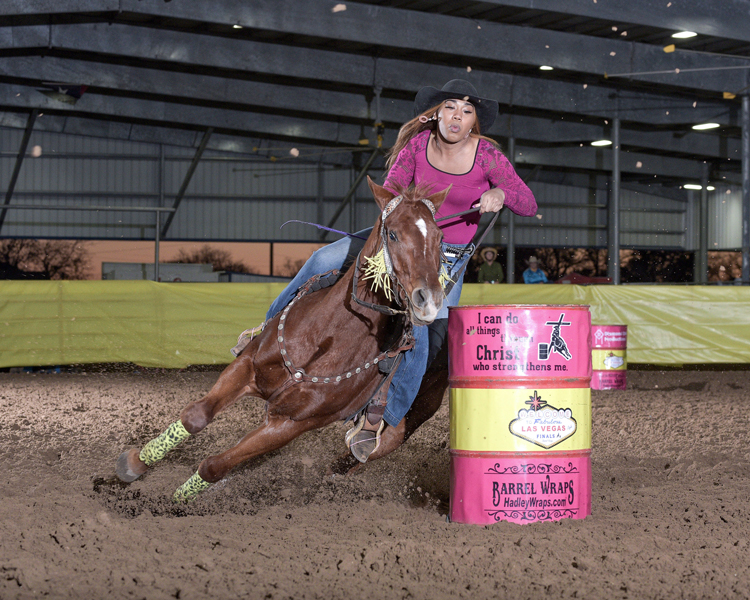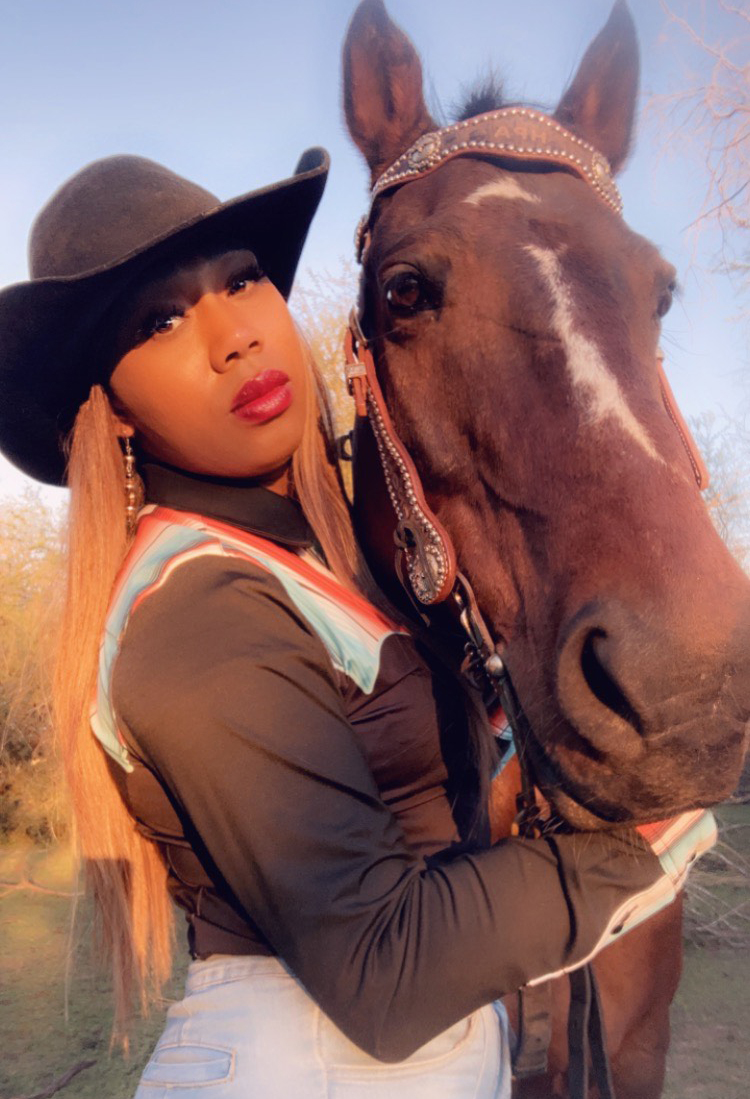
Fourth Generation Cowgirl
Arqueze Girdy defied the odds to continue her family’s rodeo legacy.

Proud rodeo star Arqueze Girdy has spent her life running barrels and breaking barriers—but neither of those things have ever been easy. She was bullied so badly in high school that she had to drop out. When she came out as transgender to her family, her grandfather kicked her out of the house. And when she started to win barrel races again and again, officials tried to disqualify her for her gender identity.
But the one thing that has always been a constant throughout her life is raising horses for the rodeo.
Horses have had a hold on Girdy since she was a youngster growing up in Victoria, Texas. “I’ve always been on a horse. As I got older, getting so much help with learning how to ride just made me a natural. The first time I saw the barrel racing at a rodeo, I told my grandma, ‘That’s what I want to do!’”
Girdy is a fourth-generation cowgirl, and barrel racing is now her full-time career at age 30. “All my family rodeoed, and some still compete. They passed it down to me starting when I was 5 years old,” she says. “I started running barrels on and off starting at 7. I stopped when I was 16, and found my way back after my transition when I was 20. From then on, it’s been a roller coaster of bad, good, scary, fun, and joyful. It’s my love, and I’ll do anything to keep doing it.”
But the journey for Girdy has not been an easy one, and she found herself in a dark place with all of the bullying. “I was just trying to recover and find myself. I just put all my time into my horses. I wasn’t always great. I worked and put in the time [whether it was] cold as heck or hot as heck. I put in the time,” she says.
When she first came out as transgender, her grandfather couldn’t accept her. “That’s why I was on the streets for a while. I escorted for maybe three months. It wasn’t for me. I tried to commit suicide three times. Hospitalized each time. That’s when I left and started dancing,” Girdy admits.
She began dancing in strip clubs throughout Texas to provide for her horses and herself until 2018. “I had a girl make me a fake ID so I could get into the big clubs. I was the first transgender dancer to dance at High Rollers Strip Club,” Girdy says. “The owner there said he knew there was something “different” about me. “He asked if I was transgender. I said, ‘Yes’ and he said, ‘I see a biological female.’ That was the most wonderful thing anyone has ever said to me.”
She continued to build her rodeo career while she was dancing up until 2018. She identifies as straight and has been in a relationship since 2019 with her best friend, a man she’s known for 16 years. “He is the love of my life!”

Girdy has a transgender daughter, Royalty, who transitioned at 10 years old. “But I also have two boys I raise—my godsons and nephews,” she says.
Her rodeo career really took off in the summer of 2014. “My horse Boycyfus is the reason that happened. Bo was like Charmayne James’ horse Scamper, but on the Black rodeo circuit. He was unstoppable. Even if there were mistakes, he still won. He was wild. He’s in semi-retirement now,” Girdy explains.
People on the circuit used to call her “the trans girl on the sorrel horse,” she remembers. “I went to so many rodeos when I was transitioning, and everyone was accepting. Then it became a problem once I started winning. I didn’t have the pretty saddles or the clothes or the blankets. They all laughed at me. When I started to win, they still laughed. But when I really started winning, they stopped laughing and started trying to ban me.”
Girdy says her competitors had no problems with her participating in rodeos, but for two years starting in 2015, a man who attended the competitions began harassing her. The first time, he targeted her by closing the gate on her as she and her horse were about to run.
“He did that at five different rodeos,” Girdy continues. “He was making drama at the rodeo, and people saw it was just jealousy. He did that for two years. People blasted me on the internet and talked about me. And I was dating his brother at that time. Turned out he was gay and in the closet. There were times I just drove to the barn and cried. There were too many people picking at me and trying to keep me from competing. Bo was taking care of me, doing what he loved to do—running barrels.”
In 2019, her story went global when she was excluded from the MLK Scholarship and Rodeo in Rosenberg. After submitting her application to compete in the event, Girdy was told she could not compete because she didn’t bring her birth certificate to register.
The MLK Scholarship and Rodeo, governed by the Women’s Professional Rodeo Cowboys Association (WPRCA), required her birth certificate at the fairgrounds.
“There were stories about me all around the world,” Girdy says. “I was fully transitioned by then, and the head of the rodeo was trying to make trouble. So we went to the media and they came to Rosenberg when I was there practicing. By the time we were having dinner [that night], we had gone viral.
“Nothing will stop us unless we let it stop us,” Girdy reminds us.
In 2019, thanks to Girdy’s tenacity, the bylaws of the Women’s Professional Rodeo Association were changed to include transgender people, similar to the current rules for the Olympics.
Girdy is currently working toward earning her Women’s Professional Rodeo Association permit and getting the colts she’s now riding to a higher level of competition. “It’s rodeos left and right coming up!” she adds.
Even today, people still try to keep Girdy from competing. “The world is changing, and I’m glad I’ve made history. I want to be a good example for others, including my daughter, by staying strong and fighting. You have to be as tough as the nails that stick in a board. You’ll never get as far if you don’t fight back. I love to share my story, because it shows the demons we have to fight.”
For more info on Arqueze Girdy, visit tinyurl.com/2p98ehkp










